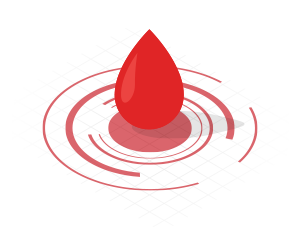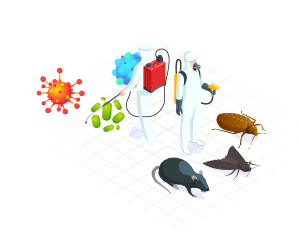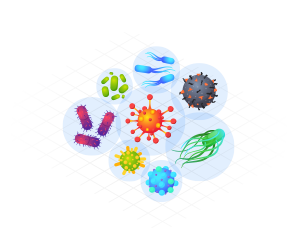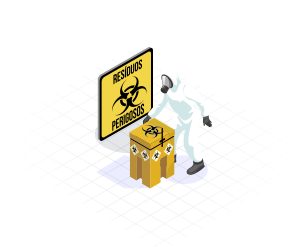


Waste contaminated or suspected of being contaminated by blood, other potentially infectious body fluids (e.g. semen, vaginal secretions, cerebrospinal fluid, synovial fluid and amniotic fluid), as well as any other potentially contaminated material (e.g. vomit, feces) or exposed to biological agents (e.g. viruses, bacteria or fungi), are classified as Hazardous Waste as they have dangerous characteristics.
BLOOD – INFECTIOUS HAZARDOUS WASTE

According to the Portuguese Environment Agency's waste classification guide, the classification of waste as hazardous will depend on the individual hazardousness of its constituents.

Waste is considered hazardous if it possesses at least one of the hazardous properties defined in Regulations (EU) No. 1357/2014 and (EU) 2017/997. In total, 15 hazardous properties are identified, one of which is HP9, which refers to infectious waste: “materials containing viable microorganisms, or their toxins, which are known or have good reason to believe that they cause disease in humans or other living organisms”.
HAZARDOUS WASTE MANAGEMENT

In characterizing the hazardousness of waste, any contaminated material that has been exposed to infectious factors or environments (such as blood, feces, waste, death sites, accumulated garbage, unhealthy environments, flooding with sewage water, among others) is classified as Infectious Hazardous Waste, presenting risks to both human health and living beings.

Its disposal in containers intended for Urban Solid Waste (RSU) is expressly prohibited, constituting a serious environmental offence, subject to a minimum fine of €20,000 (article no. 117, within the scope of the Framework Law on Environmental Offences, Law no. 50/2006, and respective amendments).
RELATED INFORMATION

CLASSIFICATION OF INFECTIOUS WASTE
Waste contaminated or suspected of being contaminated by blood, other potentially infectious body fluids (e.g. semen, vaginal secretions, cerebrospinal fluid, synovial fluid and amniotic fluid), as well as any other potentially contaminated material (e.g. vomit, feces) or exposed to biological agents (e.g. viruses, bacteria or fungi), are classified as Hazardous Waste as they have dangerous characteristics.
According to current legislation, hazardous waste must be treated in a specialized and differentiated manner, as it poses a significant risk to public health and the environment. Therefore, the disposal of waste contaminated with blood or other bodily fluids in regular waste containers is strictly prohibited and may result in fines and other legal penalties.
THE DEATHCLEAN® fully complies with the provisions of Decree-Law No. 102-D/2020, which approves the General Waste Management Regime, highlighting article No. 117, related to the Framework Law on Environmental Offenses (Law No. 50/2006 and its successive amendments), where, depending on the severity of the offense, the amounts of the applicable fines are defined.

BLOOD – INFECTIOUS HAZARDOUS WASTE
According to the Portuguese Environment Agency's waste classification guide, the classification of waste as hazardous will depend on the individual hazardousness of its constituents.
Waste is considered hazardous if it possesses at least one of the hazardous properties defined in Regulations (EU) No. 1357/2014 and (EU) 2017/997. In total, 15 hazardous properties are identified, one of which is HP9, which refers to infectious waste: “materials containing viable microorganisms, or their toxins, which are known or have good reason to believe that they cause disease in humans or other living organisms”.
The Portuguese Environment Agency further clarifies that “Hazardous Waste” is generated mainly in industry, but also in the health, agriculture, commerce, services sectors and even in citizens' homes.
Considering that there are several diseases that can be transmitted through blood or other bodily fluids, this waste is classified as “Hazardous Infectious”.

INFECTIOUS HAZARDOUS WASTE MANAGEMENT
When characterizing the hazardousness of waste, any contaminated material that has been exposed to infectious factors or environments (such as blood, feces, waste, death sites, accumulated garbage, unsanitary environments, flooding with sewage, among others) is classified as Infectious Hazardous Waste, posing risks to both human health and living beings. Its disposal in containers designated for Urban Solid Waste (MSW) is expressly prohibited and constitutes a serious environmental infraction, subject to a minimum fine of €20,000 (article no. 117, under the Framework Law on Environmental Offenses, Law no. 50/2006, and its amendments).
This waste must be sent to a management operator licensed for the treatment of hazardous waste, and the issuance of an Electronic Waste Monitoring Guide (e-GAR) is mandatory, in accordance with Order No. 28/2019.
Due to the danger of waste, both to human health and the environment, it is essential that its management be carried out appropriately and rigorously.
THE DEATHCLEAN® is the only national entity duly certified and legalized to carry out the cleaning and disinfection of contaminated sites with biological risk, in accordance with Decree-Law No. 102-A/2020 (which amends Decree-Law No. 84/97), thus ensuring the correct cleaning and legal disposal of Infectious Hazardous Waste.









